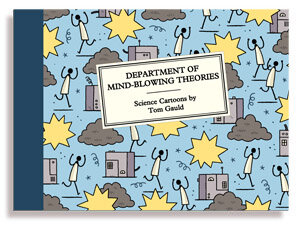During the last Festival international de la Bande dessinée à Angoulême, we met Tom Gauld and we talked with him about his work. Here is what he told us.
Tom Gauld, what were your links with the press before you began to publish your own strips ?
I did have links with the press because when I left college, I was making comics in my spare time. But I was earning my living as an illustrator. I worked for both The Guardian and the New Scientist as an illustrator before I worked for them as a cartoonist. But when I made comics, I always sent them to my editors and said :
“Enjoy these, maybe I can do a comic one day”.
Why drawing strips can be exciting for you ?
I just always loved drawing. As a kid, I spent half my life sitting on the floor drawing and probably most of the other half reading comics. And I used to think I wanted to be a comic artist rather than a writer. I imagined I would not be good enough to write a story. That was when I was a child or a teenager. I imagined I’ll find somebody to write the words and I’ll draw pictures.
But when I was in an Art school, I had friends who were making mini comics. I started reading them. Then I started telling my own stories and overtime I’ve realized that’s almost more fun than drawing away.
Have you make your own fanzine ?
I didn’t make any, but I’ve discovered fanzines made by some friends. I eventually made some self published works on my own, but that was later.
How do you manage when you have to give back your strips as often as for a newspaper ?
The regular making of small works is somehow quite well suited to my personality. I find the weekly deadline of tuesday or wednesday and I have to have a piece of work finished for that. I really find that helps focus my mind and stops me being a complete perfectionist. And to pick an idea and make it as good as possible, it can work well and help me come out with ideas.
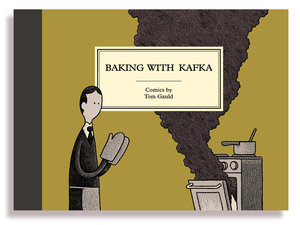
So having a deadline every week is better for your organization ?
Yes I find it much easier to make a book like this weekly and store it once. At the moment, I’m trying to make a new graphic novel and I find that much much harder. I find the small ideas easier to come up with.
That’s the way to work that you prefer.
That’s the most comfortable for me but I love the form of the graphic novel so much that I’m willing to try even if I find it more difficult.
I love to do longer stories and I want to do more, but I am a terrible procrastinator. So I spent months thinking about a new graphic novel and I still haven’t started work on it.
Are some cartoonists an inspiration for you ?
Hundreds. For the short funny cartoons, I’d say the biggest influence is Gary Larson. His cartoons appeared in my local newspapers when I was growing up. I absolutely loved this amazing and real humor. I used to cut all the strips and keep them in a letter box. When I started making short funny cartoons, I was having some similarities.
And a lot of other people. When I was in Art school, I discovered the work of Edward Gorey. That was a big influence and a big change for me. The way he made picture stories that were not exactly comics but used many of the tools of comics.
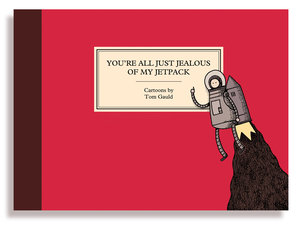
Do you think there is a difference between British and French humor ?
It’s a difficult question, because I just grew up with British humor, it’s like feeling you don’t have an accent. I generally get asked about British humor when I’m abroad. I’m not sure I can define that, but we can be funny with keeping a straight face. I think there is a bit of that.
How can you explain that French readers are fond of your humor ?
I think it’s partly due to Eric Fontaine the translator and Les Editions 2024. All are working very hard to translate the humor. When I first started making books of these cartoons, I didn’t imagine they would sell very well outside of the English speaking world. I saw how it’s hard to translate humor and cultural references. For the Spanish publisher Salamandra and Edition Moderne for a German translation, it’s also a hard work, but I’m delighted.
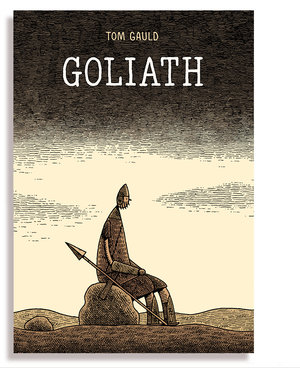
Do you work with your French translator ?
A little, they manage very much on their own. But they usually need to cut one or two strips, which just can’t be translated. When the joke is based on English grammar, which can’t be translated in french. Or when it’s a very specifically British reference.
In the French edition, there are two or three cartoons which are different from the English.
With Netflix and the internet, I think we are all a bit more used to humor from other cultures. We are less surprised by that.
You have a strong relationship with the world of literature and sciences
Sometimes I feel a bit of a fraud when I am in an interview like this. Because you could imagine that I spend my whole life in a library reading and researching. I do love to read but the job for The Guardian is to make cartoons about literature. If I didn’t have that job, I think I’ll still make them, but not one every week.
My job at The Guardian and at New Scientist is not to be as clever as the people writing the books or the scientists. My job is to be funny in a respectful way, the way you tease a friend you really love.
You don’t want to hurt anybody.
I am too much of a coward to hurt anybody because I’m afraid they will come back and hit me. Generally, there is some satire but it’s quite gentle.
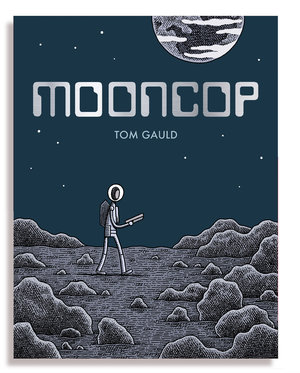
For you, is the computer the perfect device to save time in your work ?
I always really use a computer for coloring. I do most of my drawings in a notebook, I always have a little like this with me.
I just use a pen for sketches and I work on paper with a pencil. I use the lightbox a lot, I trace until I get something I like. And for the color, I use Photoshop.
Would you like to use something else for the color ?
I was in Paris before I came here, and I went to the Blutch show. He painted the color of his new book, using watercolor. And it’s so beautiful. I was quite jealous because I am terrible with color, I am quite colorblind. So the computer is better for me. Then I can color and recolor. I’d love to make watercolor, but I just don’t have this skill.
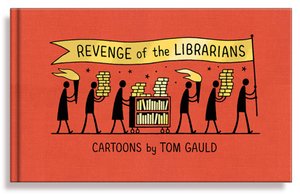
Your drawings are the same size than in your books
I drew a little bit bigger. When I started drawing comics, I didn’t know any professional cartoonists. And I didn’t realize that people usually draw things bigger and reduce them. I thought everyone was just drawing quite small. I have the habit of drawing quite similar to the size. That stops me being a complete perfectionist like a robot and it feels handmade.
Could you tell us more about your projects ?
I’ve got no new book coming out. Last year after Angoulême, I did a lot of traveling when this book and my children’s book came out. This year, my plan is to stay in London and make a new graphic novel. Tell everybody that, that will force me to do it !
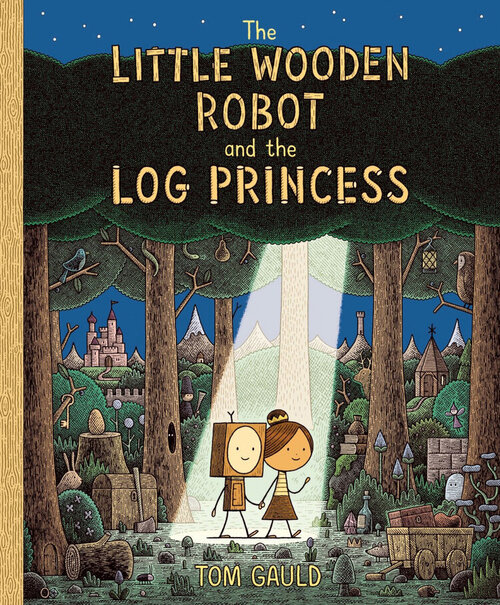
I have a few ideas but I need to pick one and do it. I don’t yet know what it will be. I think I will work again with Editions 2024 and my very nice team of publishers in Europe.
Thank you very much Tom Gauld for the time you spent with us, answering our questions.
Interview réalisée durant le festival d’Angoulême 2023 par Damien Canteau et Claire Karius.
Mise en page par Damien Canteau et Claire Karius
Traduction et retranscription par Claire Karius.

- La revanche des bibliothécaires
- Auteur : Tom Gauld
- Traducteur : Eric Fontaine
- Éditeur : 2024
- Prix : 17 €
- Parution : 16 septembre 2022
- ISBN : 9782383870234
Résumé de l’éditeur : Sous l’œil hautain d’un chat impassible, l’auteur avance, hésitant, essayant — vainement — d’échapper aux affres de la Création pour trouver le chemin du succès ! Pendant ce temps, l’éditeur travaille d’arrache-pied sur de nouveaux concepts : poésie pratique ; théories conspirationnistes de plages ; classiques résumés pour lecteurs pressés ! Le libraire, lui, tient bon la barre entre les avalanches de cartons et les demandes impossibles de son alter-ego infernal : le lecteur. Et les bibliothécaires ? ils poussent leur chariots, sans bruit, seuls à savoir qu’ils dominent dans l’ombre ce petit monde qui s’agite en vain. À grands coups de diagrammes abscons, de schémas absurdes et de strips hilarants, c’est le grand portrait du petit monde du Livre que Tom Gauld nous brosse ici, avec humour, finesse et intelligence ! Moins tatoué qu’Augustin Trapenard mais pas moins drôle que Bernard Pivot, Tom Gauld est publié chaque semaine dans le cahier littéraire du Guardian et il s’est imposé, en quelques années, comme l’un des auteurs incontournables du monde Anglo-saxon. Avec ce nouvel album, il nous offre de quoi réveiller notre rentrée littéraire… Lectrices, lecteurs, amoureux des livres de tout poil : voici votre nouveau livre de chevet !



